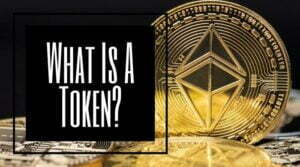What is a token? In cryptocurrency terms, this refers to the representation or denomination of a “tradable” virtual currency that, as Investopedia describes it, resides on its own blockchain.
 Crypto tokens store value, can be used to buy, sell, or trade, and can be used as investments. There are altcoin tokens as well as more “traditional” crypto tokens.
Crypto tokens store value, can be used to buy, sell, or trade, and can be used as investments. There are altcoin tokens as well as more “traditional” crypto tokens.
How Crypto Tokens Work
Crypto tokens are found in blockchains, the databases that store the data in chains or links. The tokens are mined or harvested, bought and sold, 100% virtually using decentralized processes. Crypto tokens can represent points, time spent accessing online content, or cryptocurrency itself.
You may find crypto tokens offered through an exchange or other source, especially if that company chooses to make an Initial Public Offering and sell shares of stock in the company. Those shares may or may not be offered in exchange for cryptocurrency, and may or may not yield crypto tokens as the dividend if and when applicable.
You can buy-and-hold crypto tokens, or you can actively trade them. The thing to remember about crypto tokens and virtual currency in general is that the markets where they are traded are far less regulated and your risk of loss is substantial.
Differences Between Tokens, Virtual Currency, and Altcoins
Some do use the terms above interchangeably. But what is the reality–are Bitcoin, crypto tokens, and altcoins the same thing? Not necessarily.
For every person who uses those terms as though they all mean the same thing, there are those who point out that Bitcoin and other cryptocurrency is basically exactly that–a form of digital money. In this case, the virtual cash has no inherent value and relies on investor enthusiasm to increase in value.
Altcoins are an alternative to Bitcoin and are often advertised as a means to sidestep some of the complaints investors have about Bitcoin.
No single cryptocurrency is more popular–or pricey–at press time than Bitcoin. Altcoins may not have the dollars behind them that Bitcoin or even Ethereum have but there are loyalists for many different types of virtual currencies.
Some Altcoins include Bitcoin’s own version, Bitcoin Cash, but there are also others unaffiliated with either version including Litecoin, Namecoin, and the infamous Dogecoin.
These currencies have their blockchains, but crypto tokens by comparison are said to operate “on top of” the blockchain a currency resides on. Tokens are used to make the sale, trade, or exchange. Coins are used to make transactions, tokens can do that and the added tasks of storing value, etc.
Types Of Tokens
You may be offered currency tokens or asset tokens, plus there may be more set aside as rewards or security tokens. Those are just a few of the uses for crypto tokens. Some people use the word to describe any virtual currency that is not Ethereum or Bitcoin.
Some tokens may even be provided to those who are part of a team or group who act as the planners or developers for an app or other product. These are referred to by some sources as governance tokens. Another type of crypto token has made headlines–the Non-Fungible Token or NFT.
This is one of the instances where a crypto token may represent some type of real-world asset such as digital art, music, streaming content, video games, and much more. NFTs have become a craze among certain digital artists due to high interest in purchasing artwork or other assets using digital funds.
Things To Remember
If you are new to cryptocurrency in general, you’ll want to remember that buying, selling, and trading crypto relies heavily on your ability to securely store private keys for your crypto assets. Lose your private keys and you lose your investment.
It’s crucial to protect your investments by using best practices–don’t put all your investment funds into any single type of stock, commodity, bonds, etc.
You should, as a newcomer to virtual currency, avoid any type of investment situation that allows or requires you to borrow funds to continue investing.
This type of borrowing, sometimes referred to as margin trading, is risky even for those who know what they are doing. If you are new to investing or even just new to this type of investing, avoid margin trading until you fully understand how the rules work and what the consequences of breaching those rules might be.
Margin traders risk not only the loss of their investment funds, but also risk going into debt above and beyond the original amount invested due to margin calls. Not sure what that means?
If you are interested in crypto tokens, NFTs, and other opportunities but you have to have the phrase “margin call” explained to you in the context of crypto, you are NOT READY to invest using margin trading with Bitcoin, Ethereum, etc. Many new investors have been badly burned because they did not understand when their investment borrowing might be called in as due in full.
Joe Wallace has covered real estate and financial topics, including crypto and NFTs since 1995. His work has appeared on Veteran.com, The Pentagon Channel, ABC and many print and online publications. Joe is a 13-year veteran of the United States Air Force and a former reporter for Air Force Television News.


